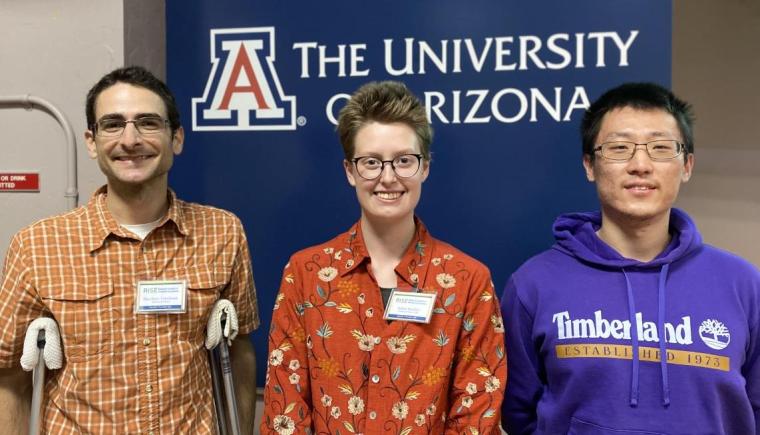2022 RISE Symposium
On Saturday 05 November 2022, seventy-six people attended the 18th Annual RISE (Research Insights in Semi-Arid Environments) Symposium in person. It was the largest audience for the Symposium, and many said the best one so far. You can find the program and links to pdf version of the talks and posters presented at http://www.tucson.ars.ag.gov/rise/index.htm
The objectives of the symposium are to share recent results of scientific research in semiarid environments, with an emphasis on work conducted at the USDA-ARS Walnut Gulch Experimental Watershed (WGEW) and the University of Arizona Santa Rita Experimental Range (SRER), and to encourage collaboration among researchers on future research and outreach activities.
This year, 11 speakers covered a wide variety of topics, and some included results of work completed and on-going at WGEW or SRER. Updates for the Santa Rita and National Ecological Observatory Network (NEON) on the Santa Rita were provided by Brett Blum from Abe Karam, respectively. Paula Mabee, Director of NEON provided an update of recent advances in data provision and opportunities across the entire NEON enterprise.
Presentations of recent and ongoing research by new faculty in the School of Natural Resources and the Environment (SNRE) covered the decline of butterflies in the west using citizen science on-line data sources (Katie Prudic), fire severity impacts on post-fire vegetation recovery (Rachel Mitchell), and human motivations to control the spread of buffelgrass in Pima County (Aaron Lien). Don Falk (SNRE) provided a comprehensive description of vegetation resilience after two fires on 20 years on the Santa Catalina Mountains, and how that resilience varied by fire intensity, fire frequency, and plant community type. Don’s work included original research and discoveries by many of his recent graduate students. Russ Scott (USDA-ARS) provided a thorough look at ecosystem function responses to long-term drought in the West, and to the recent weather whiplash (extreme dry year followed by extreme wet year).
Greg Barron Gafford (GEOG) presented the concept of Agrivoltaics, solar voltaic panels above food crops, and how crops and solar energy production can benefit as well as water use efficiency. New technology was also the subject of Brandon Mayer’s (SNRE) talk about satellite-based virtual fencing to control livestock distribution on the Santa Rita based on the initial year of research and practice. Brandon gave one of the best talks of the program, which is a remarkable achievement for a Master of Science Student.
Petey Mesquitey, KXCI radio contributor and renowned natural history essayist, humorist, poet, and songwriter closed the meeting with another of his original and entertaining takes on life and living in the Borderlands.
The highlight was the 1.5-hour poster session where 19 presenters led a cacophony of discussion in the Marley Building foyer. Through a generous contribution from long-time supporter Mr. Malcolm
McGregor, there were monetary awards for the Best Graduate and Undergraduate posters reporting research performed by students working at WGEW or SRER, or using data collected at those facilities. These posters are available for viewing at http://www.tucson.ars.ag.gov/rise/index.htm.
Graduate Student Contest Winners
First place at $500, Harrison Friedman for the poster titled Santa Rita RainMan summer season soil microbial activities vary with severity of prior winter drought
Second place at $300, Tianyi Hu for poster titled The feedback of Arizona grassland to changing hydroclimate and its impact on equilibrium state of carbon and water fluxes over time: A scenario analysis using CLM5.0. He was awarded First place for a different poster last year.
Undergraduate Student Contest Winners
First place at $300, Robin Bradley for the poster titled Microbial drivers support Lehmann’s lovegrass germination and persistence at the Santa Rita Experimental Range. She was awarded first place for a different poster last year.
One sad announcement was made at RISE this year. The good friend of RISE and the Santa Rita, Malcolm McGregor passed away in October 2022. His long interest, involvement, and positive impact was much appreciated, and he will be dearly missed. We plan to continue supporting the monetary awards for the student poster contest in his honor.
Members of the Tierra Seca Club, which is the student chapter of the Society for Range Management provided coffee, juice, fruit, cheese and baked goodies for attendees before the talks began at 9 am. The Club will use donations for providing these goodies to help cover travel expenses to the national meeting of the Society for Range Management this February 2023 in Idaho.
RISE 2022_Poster winners.jpg


